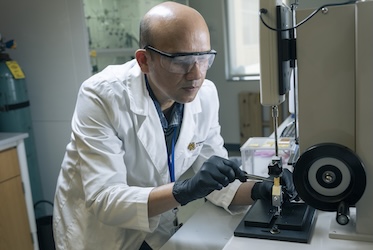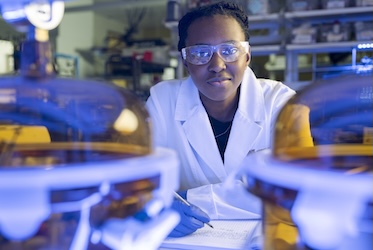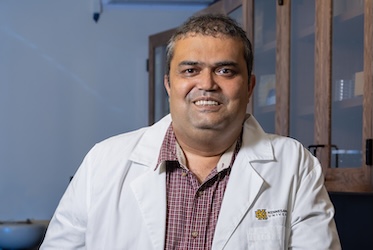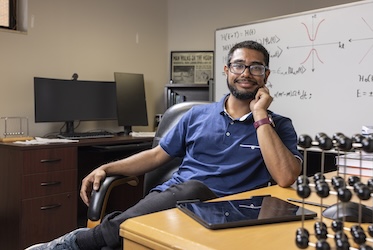
On top of the world
KENNESAW, Ga. | May 4, 2018
Kennesaw State professor ranked as No. 1 physicist

For fans of the CBS hit “The Big Bang Theory” Nikolaos Kidonakis is their real-life Sheldon. Unlike the fictional Caltech scientist, however, this Kennesaw State University theoretical particle physics professor (and genuine Caltech grad) has gained international recognition by CERN physicists in their newly released “Biblioranking fundamental physics.”
Kidonakis is ranked as the No. 1 physicist, since 2010, in fundamental physics in a worldwide comprehensive study by CERN physicists who use the open-source INSPIRE bibliographic database to rank papers and physicists around the world. CERN stands for the European Laboratory for Particle Physics.
In addition to Kidonakis, Marco Guzzi, who joined Kennesaw State last year as assistant professor of theoretical particle physics, is a co-author on a paper that has been ranked No. 8 as a top-referred paper among all papers with fewer than 10 authors since 2010.
“Nick was ranked No. 1 for his work since 2010 under three different methods: individual citations, paper rank, and overall author rank,” said Kevin Stokes, professor and chair of the department of physics. “The individual citations are particularly relevant; this is the number of times Nick’s work has been cited by other scientists which is probably the best external measure of the quality and significance of his work.”
The world’s most complete physics database, INSPIRE contains more than 1.27 million scientific papers by more than 70,000 authors and 7,500 institutions.
“This means a lot because they are citing his results, his insights, his work, his calculations,” Stokes said. “To put this in perspective, he ranks ahead of scientists from Fermilab, Universitat Bonn, Imperial College London, Institute for Advanced Study (Princeton), Harvard University and Stanford University.”
The study, which includes developments in physics over the past century and beyond, covers many subfields of fundamental physics from high energy theory and experiment to nuclear theory and experiment to astrophysics, and many more.
“I’m on the INSPIRE database every day. It’s an immense digital library where I can find links to abstracts or read the latest papers in my field,” Kidonakis said. “So, of course, I am honored by this distinction because I have been ranked No. 1 in fundamental physics, and also No.1 in my subfield of theoretical particle physics since 1993.”
Kidonakis’ research involves the elementary particles in physics, including the top quark and the Higgs boson, which the media often refers to as the “God particle.” His calculations have been used by scientists running experiments at the Large Hadron Collider at CERN near Geneva, Switzerland.
In July 2012, scientists at CERN made news around the world when, after analyzing data from a series of experiments, they announced they were certain that the Higgs boson had been discovered. This offered scientific proof, supporting the work of Kidonakis and other physicists.
“I do what I do because I love it. As Kennesaw State becomes more and more research-oriented, people are starting to notice the university, and now it has a Carnegie research designation which is a major step up,” he said.
For non-scientists, it’s Kidonakis’ work on the Higgs boson — as part of both Standard Model calculations and beyond the Standard Model physics — that most people can relate to.
“The next question is whether the Higgs boson that we found is the Standard Model Higgs or a more exotic kind of Higgs particle,” he said.
Kidonakis joined Kennesaw State in 2004, following his work as a Marie Curie Research Fellow in the Cavendish Laboratory at the University of Cambridge. He has been supported with research grants from the National Science Foundation since 2006.
While at KSU, he has been recognized with several major awards including the Outstanding Research and Creative Activity Award, KSU Foundation (2016) and the Foundation Prize in 2014, 2012, 2008 and 2006. He was a finalist for the KSU University Distinguished Professor award in 2017 and won the Kennesaw State University Distinguished Research and Creative Activity Award in 2014 and the Distinguished Scholarship Award in 2008.
Kidonakis, who completed his B.S. at Caltech, received his master’s from the University of Cambridge and, in 1996, his Ph.D. from the State University of New York at Stony Brook.
A fan of “The Big Bang Theory” sitcom, Kidonakis appreciates how the show’s popularity has inspired so many budding physics students.
He also has been known to channel some of “Big Bang’s” lead character Sheldon’s trademark sarcasm on occasion around the family dinner table.
“My wife teaches math and my teenage sons, who are still in high school, are studying college math. So, sometimes my sons will try to get me on some math problem,” Kidonakis said.
“That’s when I remind them, “INSPIRE says I’m No. 1.”
– Robert S. Godlewski
Photos by Lauren Kress
Related Stories

Kennesaw State researcher tackling sustainability through use of transparent wood

Chemistry student engaged in sustainable catalyst research through Kennesaw State's First-Year Scholars program

Kennesaw State researchers awarded Department of Energy grant to investigate materials that boost energy-efficient technologies

Kennesaw State physics student awarded Goldwater Scholarship
A leader in innovative teaching and learning, Kennesaw State University offers undergraduate, graduate, and doctoral degrees to its more than 47,000 students. Kennesaw State is a member of the University System of Georgia with 11 academic colleges. The university’s vibrant campus culture, diverse population, strong global ties, and entrepreneurial spirit draw students from throughout the country and the world. Kennesaw State is a Carnegie-designated doctoral research institution (R2), placing it among an elite group of only 8 percent of U.S. colleges and universities with an R1 or R2 status. For more information, visit kennesaw.edu.















